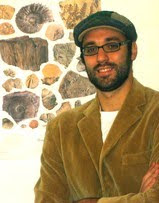“Geology is a science of connection to our real environment, informed by the action of signs, a geosemiosis, that leads investigators on a fruitful course of hypothesis generation”
- Victor Baker (1999)
Keeping with Baker (1999), geological
reasoning is inextricably tied to the objects of investigation. However, earth
scientists are not only interested in geological objects, but in their spatial
and temporal distribution too. For this reason, pattern finding is of vital
importance for geologists. In fact, from the scale of the Benioff zone to the
minute details of microfossils, regularities are crucial for interpreting geological
processes.
Not surprisingly, geological eyes are
particularly sensitive to patterns, as beautifully expressed by the art of Enrico
Serpagli. Among the most influential Italian paleontologists, Enrico Serpagli
is also a specialist in finding aesthetic patterns within natural and
artificial objects.It is not a case that one of his exhibits
was entitled “Il Senso dell’Ordine” (“The Sense of Order”), including
astonishing patterns of colour and shape.
 |
| Patterns in the art of Enrico Serpagli. Photo from valtaro.it |
However, the detailed photographs of the
artist are not mere recordings, but true visions of the invisible. This concept
is expressed in his new exhibit, “Paesaggi Invisibili” (“Invisible Landscapes”),
set in the historical town of Sassuolo (31 March
– 22 April 2012; Paggeria Arte, Piazzale della Rosa, Palazzo Ducale, Sassuolo, Italy).
Although the exhibit is not specifically devoted to geological themes, a
geological ‘invisible landscape’ from Yellowstone
is among the exhibited artworks.
From an analytical point of view,
‘Invisible Landscapes’ offers the amazing possibility of seeing the role of
patterns for the geological artist. However, I prefer to be more emotional, and
the exhibit is a structured walk through the invisible lands of Enrico
Serpagli, the master of artistic patterns.
REFERENCES
Baker, V. (1999). Geosemiosis. GSA
Bulletin, 111(5)






